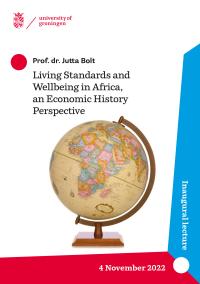Living Standards and Wellbeing in Africa, an Economic History Perspective
Synopsis
Why are we in the Netherlands today so much richer than our grand and great-grand parents, living only 50, 100, 200 years ago? Or why are some countries richer than other? Questions like these lie at the heart of Economic History.
The basis for answering these questions is consistent data on long run global development, which we collect within the Maddison Project. Our research shows that over the past 200 year, the average global income per person has increased nearly 12 times (Bolt & Van Zanden, 2020; OECD, 2021).
Further, economic growth accelerated over time. During the 19th century, the average global income doubled to roughly 2200 dollars; during the twentieth century the global average income quadrupled to over 12,000 dollars. While this is impressive economic progress, if we look at different countries around the world today, it is clear that this average development has not brought everyone the same progress.
Economic history research and Africa
One of the regions that currently features in the lower half of the world’s income distribution is Africa. However, for long, Africa hardly featured in global economic history debates due to lacking historical data on development. In my lecture I will discuss how economic history research, based on previously unexplored archival material, has not only rewritten African history, but also provided a much better understanding of drivers of development. This has pushed Africa’s long run experience into global economic history debates and thereby provided important new impetus into theories of long run global development.
Design and layout: LINE UP boek en media bv | Riëtte van Zwol, Mirjam Kroondijk
Cover photo: Replogle Globes Partners LLC (https://replogleglobes.com/)
Author photo: Reyer Boxem
Published by University of Groningen Press
Broerstraat 4
9712 CP Groningen
https://ugp.rug.nl/
Downloads

Downloads
Published
Series
Categories
License

This work is licensed under a Creative Commons Attribution-NonCommercial-NoDerivatives 4.0 International License.



